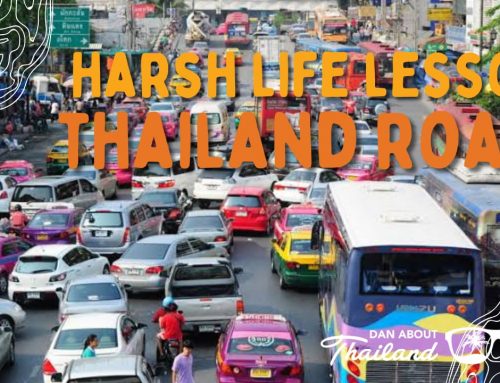From a beaming warm smile and wai to sheer aggression and anger; the polarisation could not be more stark when you look at how Thai people change once they get behind the steering wheel of their cars. When I first started driving in Thailand I had to learn the unwritten rules of the road fast, if not it would only have led to an accident pretty quickly.
Thai people are known as a peaceful loving nationality, but this perception is ripped to sheds after you start driving in Thailand. It is no wonder Thai roads are officially the most dangerous in the world. In a 2017 report, released by the World Atlas website, it says there is more chance of people being killed on Thailand’s road than on the roads in places like Malawi, Iran, Rwanda and Lesotho. This is all down to those supposedly peaceful, fun loving Thais driving on the roads, well think again as all is not what it seems.
The BBC described driving on a Thai expressway is akin to playing a hyper-caffeinated video game.

Thailand is not all sunshine and smiles
This aggressive driving in many ways reveals the uglier underbelly to Thai society that can be missed by the casual traveler. Take another metric, deaths by gun. According to gunpolicy.org there are 3.48 deaths per 100,000 people in Thailand, which is just under that of the States. It has the highest death rate by guns in Asia, followed by Sri Lanka with 2.79 gun deaths per 100,000, Cambodia with 1.58 and Myanmar with 1.10.
There is indeed a darker side to Thailand. So, maybe we should not be so shocked by their appalling and dangerous driving?
What you need to know when driving in Thailand
In Europe when a car flashes their lights to you it, as an unwritten rule, means they will give way to you and that you can proceed. In Thailand it means get out of the way as they are coming through, no matter what, they will certainly not slow down ‘just in case’.
With traffic lights, cars and motorbikes will always jump the red lights. The stop line is always crossed for vehicles waiting. Motorbikes will cut in front of you as soon as you start moving away from the lights when they have changed to green.
On a main road with, say, three lanes; when turning right in the correct right hand lane, cars will also stop in the second lane to turn right causing congestion for cars just want to keeping driving straight.
If you need to change lanes in busy traffic it is best to signal at the latest point, as if you signal too early the cars behind will see you want to get across and make it difficult for you to do so.
Hard shoulders are often used as a normal lane for cars to drive in.
But should we be surprised?
If you get caught driving without a license you will be fined 200 baht, hardly a deterrent. It is also a 200 baht fine for not wearing a crash helmet when on a motorbike (US$6).
Passing your driving test in Thailand is also very easy and someone with next to no driving experience can get through the test.
It means the roads are filled with ill discipline and bad driving from the get-go.
Through time this aggressive driving ‘culture’ has become the norm and so everyone does it, but it also does give some insight to the other side of Thai characteristics and traits that are out there.
The popular image of the smiling wai-ing Thai is not the full story at all. It is for this and reasons listed above why we should not be surprised by the aggressive and bad Thai driving.
Let Dan know where you need help and he will send you recommendations and help you get set up
Subscribe to Newsletter












What you say is all true Dan. All you need to do is drive very cautiously. But the “road rage” you speak about is @ another level in Australia and more so, the States. In the USA, if you cut in front of someone, they get out a gun and shoot you dead. Guess where I’d rather be?
Lack of basic driver education and the minimal fines imposed are no detterent.
Police use it to raise revenue from payday to payday.
Locally known as tea money and directed at tourists who pay cash with no receipts.
Many aspects of Thai life tourists never see.
80 people a day die on average on the roads.
Insurance, registration and licences don’t seem to matter.
Just hope that you don’t have a need to make a claim.
It’s pay up front first, cash obviously. Even if you were in the right.
Then claim from the insurance company, if they have any.
But on the whole I really enjoy driving here.
After a while you get accustomed to the lack of training, constant lane changes, pedestrian crossings have no meaning.
Running red lights… it goes on…
Welcome to Thailand.